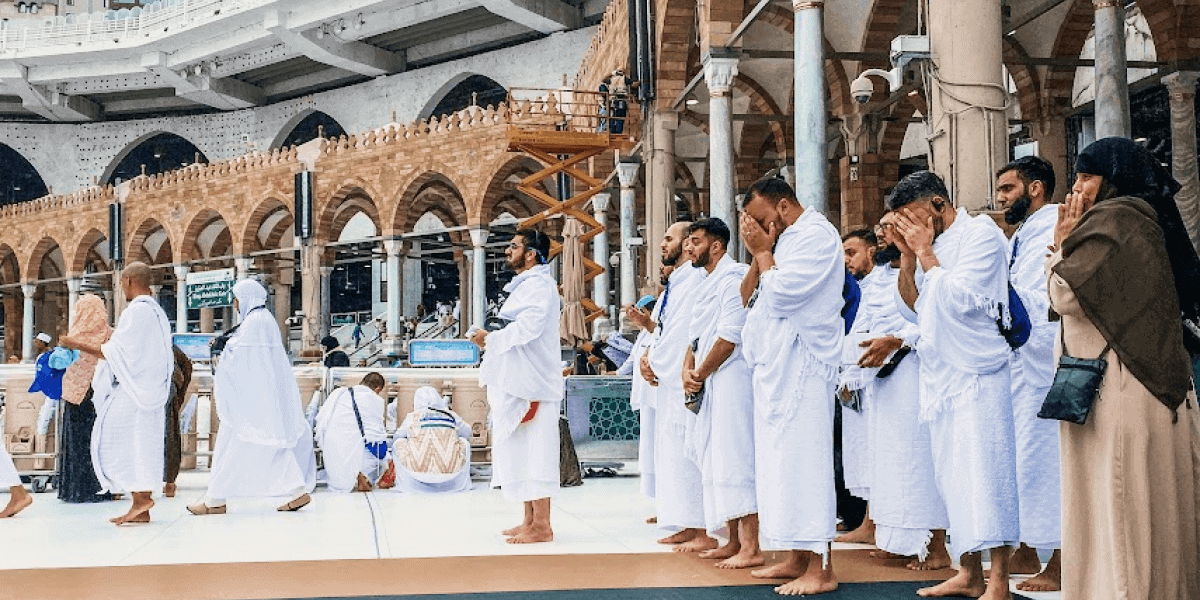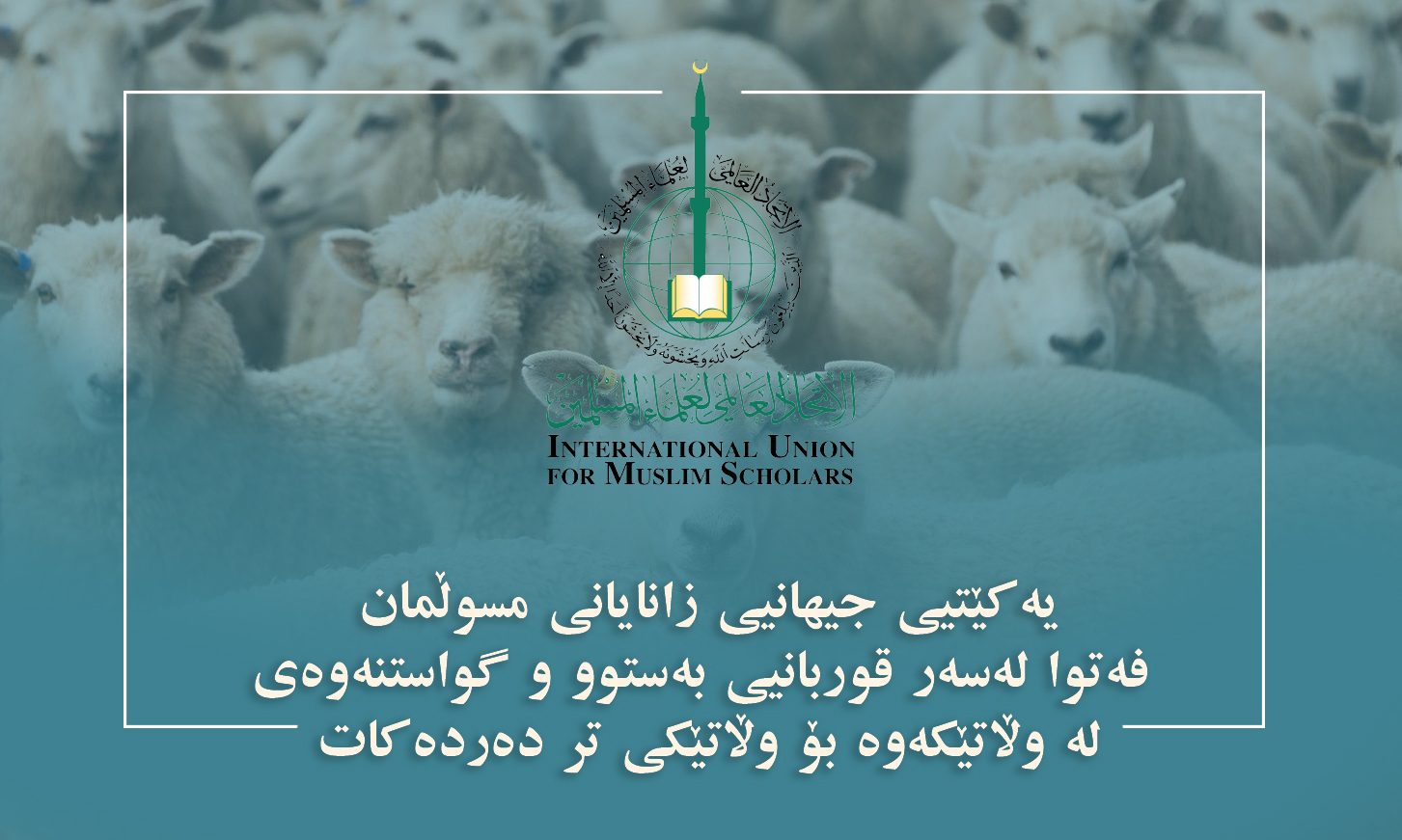Aug 09 2025

In the name of Allah, the Most Gracious, the Most Merciful
Fatwa on the Permissibility of Determining the Number of Pilgrims and Adhering to the Hajj Visa, Given the Public Necessity, and the Impermissibility of Deception in this Regard.
By Professor Dr. Ali Mohiuddin Al-Qaradaghi
President of the International Union of Muslim Scholars
I have received a number of questions regarding the permissibility of violating the administrative procedures related to the Hajj permit.
Is it permissible to violate this law, based on the verse {And [due] to Allah from the people is a pilgrimage to the House - for whoever is able to find thereto a way} (Al-Imran: 97)? Because the word (sabīlan - a way) is indefinite (nakirah), it is argued that this proves the permissibility of performing Hajj by any means, even if it involves deception or is without a special Hajj permit.
Answer:
Undoubtedly, Allah the Almighty has made Hajj obligatory for everyone who is able and has made it one of the pillars of Islam. Therefore, whoever is able must strive to perform this pillar, but according to its legal and Sharia-based conditions and procedures, just like all other Islamic pillars and obligations.
The Holy Qur'an itself has pointed to the most important condition for Hajj in the verse {And [due] to Allah from the people is a pilgrimage to the House - for whoever is able to find thereto a way}, which is the condition of ability (istita'ah). We have another verse that points to another condition, which is the absence of being prevented (ihsar). Allah Almighty says: {And complete the Hajj and 'umrah for Allah. But if you are prevented, then [offer] what can be obtained with ease of sacrificial animals} (Al-Baqarah: 196).
A hadith has been reported that interprets (sabīl - way) as provisions and a mount, which a group of hadith scholars and jurists have deemed weak, while another group of scholars considers it authentic (sahih).
Interpreting (sabīl) as provisions and a mount does not prevent the existence of other criteria such as physical ability, security of the route, and the presence of a mahram for a woman (by scholarly consensus).
My point here is that scholars have not limited the conditions for Hajj to only provisions and a mount, but have added physical health, the ability to travel, the absence of fear of perishing, and the security of the route. For women, they have added other conditions.
This expansion of the circle of conditions and criteria is evidence that it is possible to add other related factors to the matter, if a clear justification is provided. Furthermore, scholars have not transgressed by providing provisions and a mount through charity and alms, because of the sense of obligation (minnah) it creates. Ibn Qudamah says: "Whoever is provided with money does not have Hajj incumbent upon them, and this does not place them among those who are able to perform Hajj, whether the giver is a relative or a stranger, whether they provide a mount, provisions, or money, it makes no difference." The Shafi'is have differentiated between a gift from someone from whom no sense of obligation is felt and those from whom it is, for example, a father providing for his son does not create a sense of obligation, whereas a stranger does.
Can the Legitimate Authority (Wali al-Amr) add new criteria and conditions?
The consensus of scholars is that the Muslim legitimate authority must be obeyed in matters of good (ma'ruf), according to the verses of the Qur'an and the noble hadiths. This means that if their decision on a matter is legitimate according to Sharia, the people must abide by it. This limitation of the number of pilgrims, with all its conditions, is legitimate. There is no doubt that this era is different from all previous eras, where the ability to travel and reach places, no matter how distant, has become easy.
If the way were opened today for pilgrims to come to Mecca, tens of millions would come, and this would create many problems and difficulties in many aspects, especially since most of the Hajj rituals are in places that certainly cannot accommodate millions, such as Mina and Muzdalifah—we will discuss them later.
This issue is strongly related to Sharia-based policy (siyasah shar'iyyah) and what scholars have discussed regarding the conditions and criteria for permissible administrative affairs, as long as, according to the assessment of scholars and experts on the subject, it achieves a benefit and prevents harm and corruption.
It was from this basis that during the Corona era, we saw many collective and individual decisions and fatwas from the scholars of the Ummah and jurisprudential councils to close mosques and abandon Friday and congregational prayers, and even to stop 'umrah during the peak of the pandemic, or to prohibit Hajj and allow only a small number from within the Kingdom of Saudi Arabia to perform it.
It is for this reason that scholars have permitted the legitimate authority to set some restrictions and conditions for certain activities, on the condition that the decisions are based on averting harm and achieving a real benefit.
The Position of the 17th Islamic Conference:
From Sha'ban 3-7, 1408 AH, corresponding to 1988, at the 17th Islamic Conference in the Hashemite Kingdom of Jordan, I presented this issue to the foreign ministers of Islamic countries. At that time, this resolution was issued:
In adherence to the principles of the charter of the Organization of the Islamic Conference, which aims to respect the sovereignty of all members, improve Islamic organization, and participate in everything that serves Islam and Muslims.
The conference takes into consideration that the government of the Kingdom of Saudi Arabia strives to facilitate the Hajj obligation and the rituals of 'umrah and visitation for all Muslims, men and women. It is aware of all the efforts made to organize the manner of performing the Hajj rituals, the pilgrims, and their movements.
After reviewing the memorandum submitted by the government of the Kingdom of Saudi Arabia, which involves initiating the implementation of a set of new plans, programs, and projects to expand the two Holy Mosques and develop and reconstruct the pilgrims' housing...
It acknowledges that welcoming and facilitating for pilgrims requires the organization of all incoming pilgrims from all over the world, in a way that provides them an opportunity to enjoy the services provided by the special agencies of the Kingdom of Saudi Arabia, in a manner that is suitable for the locations of the Hajj and 'umrah rituals.
The conference supports the measures taken by the Kingdom of Saudi Arabia to determine the number of pilgrims, based on the ratio of the population of each country to the total number of Muslims in the world.
It calls on all member states to cooperate with the Kingdom of Saudi Arabia in everything that leads to the implementation of appropriate procedures for it and to provide equal opportunities for all pilgrims and to secure their rituals and all means of comfort for them.
I have included this resolution in its entirety because its implementation achieves benefits, and not determining the number of pilgrims brings chaos and problems to the world! This is in addition to the fact that, as mentioned in the resolution, the Kingdom is making every effort to increase the number of pilgrims by expanding the Holy Mosque and preparing the ritual sites to accommodate the largest possible number of pilgrims.
Based on this resolution, a number of decisions and fatwas were issued by the Council of Senior Scholars of Saudi Arabia. Furthermore, resolution number 178 dated 26/3/1418 AH was issued regarding the organization of domestic pilgrims from within Saudi Arabia and not allowing them to repeat Hajj within five years. The resolution included the following:
After research, discussion, reflection, and striving to find a suitable solution for the suffering and problems of those who wish to perform Hajj, as well as to prevent or reduce the harms caused by severe crowding... most members of the Council of Senior Scholars see no obstacle to establishing laws to organize Saudi pilgrims. One of these is that the government does not permit someone who has performed Hajj to repeat it until five years have passed since their previous Hajj, just as is implemented for other pilgrims from outside Saudi Arabia. As long as we have a need for it, such as reducing pilgrim crowding and assisting them in performing the Hajj rituals and keeping harm and problems away from them. This is according to the verse {Allah intends for you ease and does not intend for you hardship} (Al-Baqarah: 185), as well as the verse {And strive for Allah with the striving due to Him. He has chosen you and has not placed upon you in the religion any hardship} (Al-Hajj: 78), and likewise the hadith: "Whoever fulfills the need of his brother, Allah will be there for his need." Narrated by Al-Bukhari (6951) and Muslim (2581).
Fatwa
Based on what has been discussed and what we will discuss, it becomes clear to us that it is permissible for the legitimate authority in the Kingdom of Saudi Arabia to determine the number of pilgrims and to limit the repetition of Hajj to once every five years. Indeed, if these conditions and criteria are met, then this limitation becomes required:
A public necessity or need exists, such that the ritual sites and the Haram can accommodate no more than the specified number of pilgrims. This necessity exists and is present, even though a very great effort is being made to expand the two Holy Mosques and to prepare and expand the ritual sites, to the extent that the current expansion covers most of the old city.
If the number of pilgrims is not determined, harm will occur, such as death due to crowding, as we have seen in previous years. In this case, determining the number of pilgrims becomes required, because preserving life takes precedence over performing the pillars. Indeed, through organization and determination, a balance is achieved between the two sides of the scale: performing the rituals, and preserving lives and individuals.
The determination must be just, based on a precise scale. Thanks to Allah, the determination is tied to the population criterion of each country, which allows one thousand people per million to go for Hajj. From here, it is necessary to prevent monopoly and favoritism (pertaining to any party). Just as it is necessary for officials to facilitate for pilgrims with all available means and to prevent high prices and exploitation, because the government is responsible for deploying all its capabilities to facilitate the duty of Hajj and to enable the largest number of people to have the ability to perform Hajj.
The continuation of this determination should be linked to the continuation of the necessity and need, meaning that the need should be reviewed annually, because necessity and need are measured by their own extent, according to the verse {So whoever is forced [by necessity], neither desiring [it] nor transgressing [its limit], there is no sin upon him. Indeed, Allah is Forgiving and Merciful} (Al-Baqarah: 173).
Evidence
First: Responding to the argument based on the word (sabīlan) in the verse {And [due] to Allah from the people is a pilgrimage to the House - for whoever is able to find thereto a way} (Al-Imran: 97), where the opponent says it is an indefinite word and includes every way, even if it is through deception and without a permit.
The response to that is:
The word (sabīlan) is not general ('aam), because it is indefinite (nakirah) and comes in a context of affirmation, not a context of negation, which would make it general—as the scholars of Usul (principles of jurisprudence) state. Rather, it is absolute (mutlaq) and requires interpretation. The Prophet ﷺ interpreted it as provisions and a mount (as we mentioned earlier), and scholars and commentators have added the security of the route and other things to its meaning.
The phrase (sabīlan) in no way means just any way, but rather it means those ways that have the conditions of Sharia. Meaning, if a person finds a way but has fear, meaning the security of the route is not there, then they should not perform Hajj. Moreover, if they find a way—even if it is safe—but they themselves are sick or an elderly person who is weak and does not have the ability to walk and arrive, they should not take that route to reach Hajj, but should return.
Acts of worship are not performed in an unlawful and illegal manner. For example, it is not permissible to perform Hajj with unlawful money; deception is the same, and Allah the Almighty has forbidden it. Therefore, the path that a person takes through deception is not the permissible path by which they perform Hajj. Just as it is a disobedience to the legitimate authority in a command for good. In addition to what has been mentioned, the person who violates the law and goes for Hajj without a permit will face much harm and great damage. Because they spend their money and wealth and reach the border or the airport and are denied entry from there, thus wasting their money and wealth without a legitimate reason, which is forbidden by the consensus of scholars. Or they may enter the Kingdom by some means, but are later found, arrested, and heavily fined. Indeed, they may be imprisoned and humiliated, all of which are forbidden in Sharia and are obstacles to performing Hajj.
(Sabīlan) has been interpreted by a group of commentators as provisions and a mount, based on the hadith we mentioned earlier. Another group of commentators has interpreted it as the ability to reach Hajj and have added many other conditions such as security of the route, physical health, and the like.
In any case, the sayings of scholars like Imam Malik (may Allah have mercy on him) and others cannot be imposed on the current problem of the difficulty of receiving and accommodating all those who wish to perform Hajj, whose numbers may reach tens of millions of Muslims. They did not discuss this issue. (The logical consequence of a school of thought is not necessarily part of that school of thought - Lāzim al-madhhab laysa bi-madhhab).
What does the opponent of the Hajj permit say about a passport for entering the Kingdom?
For example, today no one is allowed to enter another country from any country without a passport. Should we say it is permissible to enter the Kingdom of Saudi Arabia without a passport and illegally?!!
From here, just as the security of the route and physical ability have become conditions for the obligation of Hajj, there is no obstacle to adding this other condition, such that one of the conditions for the obligation of Hajj is obtaining a Hajj permit. In other words, this becomes an excuse for a person's Hajj to be delayed or for it to be lifted from them if they pass away and did not get to it.
Second: Mentioning some evidence for the permissibility of determining the number of pilgrims and not repeating Hajj within five years:
The rule of ability (qā'idah al-istita'ah) is one of the general, established rules for which many verses are evidence, such as {Allah does not charge a soul except [with that within] its capacity} (Al-Baqarah: 286), and also {So fear Allah as much as you are able} (At-Taghabun: 16), and likewise the hadith: "If I command you to do something, then do as much of it as you can, and if I forbid you from something, then leave it." Narrated by Al-Bukhari (7288) and Muslim (1337). It is worth noting that the places dedicated to performing the pillars and duties of Hajj at present do not have the capacity to accommodate all those who wish to perform Hajj. Therefore, it is necessary to determine the number of pilgrims based on justice, and this is what has happened.
The rules of facilitation and lifting of hardship and difficulty. Allah the Almighty says: {Allah intends for you ease and does not intend for you hardship} (Al-Baqarah: 185), and He also says: {And He has not placed upon you in the religion any hardship} (Al-Hajj: 78). Likewise, a large number of hadiths have come as evidence for these established rules. The purpose of citing this evidence is that not determining the number of pilgrims and not prohibiting the repetition of Hajj within five years brings about a set of other hardships and difficulties that cannot be borne. Indeed, it may lead to the death of many people due to crowding, as we saw in previous years, even though the Kingdom of Saudi Arabia is making every effort to expand.
The rule of not bringing about one's own destruction and not causing harm to oneself. Allah the Almighty says: {And spend in the way of Allah and do not throw [yourselves] with your [own] hands into destruction [by refraining]. And do good; indeed, Allah loves the doers of good} (Al-Baqarah: 195). Yes, this verse has been interpreted to mean refraining from spending, but the verse is general and its purpose is to forbid everything that leads to human destruction—except for jihad in the way of Allah. Ibn 'Ayyash said: "Zayd, regarding this verse {and do not throw [yourselves] with your [own] hands into destruction}, said: Destruction means for a man to perish from hunger, thirst, or walking on foot." The citation of this Qur'anic evidence here is clear. It has been established that allowing many millions of people will lead to the destruction of some of them, therefore it is necessary to determine a number that does not lead to destruction.
The narration of Al-Bukhari in his Sahih (1635), along with Ahmad (3527) with an authentic chain of transmission, as well as At-Tabarani (11165), and others with their chains from Ibn Abbas: The Prophet ﷺ, after the Tawaf al-Ifadah, went to a water-drawer and asked for water. Abbas was there and said: "O Fadl, go to your mother and bring something for the Messenger of Allah to drink." The Prophet ﷺ said: "Give me water (meaning the water from the water-drawer's hand)." Then he went to Zamzam and saw them drawing water and drinking it. He said to them: "Continue, for you are upon a good work." Then he said: "If it were not for the fear of you being competed against, I would have gone down until I put the rope here," and he pointed to his shoulder.
The hadith is evidence that the Prophet ﷺ refrained from drawing Zamzam water himself, for fear that if he did so, people would make it a Sunnah and then create crowding to get the water and compete for it due to their large numbers.Likewise, according to the opinion of the scholars, Hajj is not performed immediately, but rather it is not rushed and is performed at a leisurely pace. Al-Qurtubi says: "The Qur'an and the Sunnah have indicated that Hajj is performed at a leisurely pace, and this is one of the opinions of Malik, Ash-Shafi'i, Muhammad ibn al-Hasan, and a narration from Abu Yusuf. Some of the later Malikis are of the opinion that it must be performed immediately, but the first opinion is correct because Allah the Almighty said: {And proclaim to the people the Hajj; they will come to you on foot and on every lean camel; they will come from every distant pass} (Al-Hajj: 27), and Surah Al-Hajj is Meccan. And He said: {And [due] to Allah from the people is a pilgrimage to the House - for whoever is able to find thereto a way} (Al-Imran: 97), and this other Surah was revealed in Medina, in the third year of the Hijra, and the Prophet ﷺ did not perform Hajj until the tenth year."
Our purpose in this is that the decision to determine the number for Hajj does not mean prohibiting Hajj, but rather it means delaying it for some people, and this is permissible and legitimate, because the preferred opinion is that Hajj may be delayed.The rule of the higher objectives of Sharia (Maqasid al-Shari'ah) and the preservation of public necessities, such as the preservation of religion and the preservation of life, for which this decision becomes a necessity to achieve them, and not determining the number of pilgrims brings about harm and corruption.
Thus, it has become clear to us that it is permissible to determine the number of pilgrims according to some precise scales and not to allow the repetition of Hajj within five years. Indeed, this decision may be necessary to preserve life and religion according to the criteria we have mentioned. It has also become very clear to us that it is not permissible to deceive regarding this decision, because deception is unlawful and is a departure from obeying the legitimate authority in a command for good, and it also brings about much great harm as we mentioned earlier. And Allah knows best what is right and correct.
And may the peace and blessings of Allah be upon our Master Muhammad and upon his family and all his companions.
Professor Dr. Ali Mohiuddin Al-Qaradaghi
President of the International Union of Muslim Scholars
Dhu al-Hijjah 1445 AH









